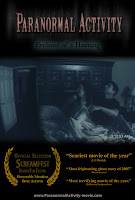 Movie Review: Where the Wild Things Are
Movie Review: Where the Wild Things AreDirected by Spike Jonze
Starring Max Records, Catherine Keener, James Gandolfini, Chris Cooper, Catherine O'Hara, Lauren Ambrose, Paul Dano
Big screen adaptations of books work seldomly well. Adaptations of children's books are even more tenuous. Yet every once in a while there is an exception of such glaring importance that it reminds us why we attempt it at all.
Maurice Sendak's book, Where the Wild Things Are has a special place in the hearts and minds of so many children and adults, not so much because of the story (a mere seven sentences long) but because of the rich, evocative illustrations; a dark tapestry full of terrifying monsters that a young boy has sway over.
As a film, Wild Things has been in negotiation for over ten years, passing from studio to studio with director Spike Jonze firmly attached, but only with final script approval. Repeatedly offers were refused as agreement could not be reached between the director, writers and studio. It looked for a long time that it was an idea that was too big for Hollywood, where a few committed minds were going to see it done correctly, or not at all.
The film (thankfully) adds little to the book in concept. In storytelling, Jonze must add some elements to the characters in order to make for a feature-length film, but what he does use shows his understanding of his protagonist so well it is hard to argue with his choices.
Max (Records) is a 12 year-old boy spending his time the way most 12 year-olds would choose to: building snow forts, starting snowball fights and, in general, being the center of his mother's attention. But life continues its steady march, and Max is growing up, causing a lot of frustration and confusion in his mind. When tempers finally flare, causing Max to don his iconic wolf suit, it is a fight for his mother's attention. Max flees into the night, running until he finds a boat in which he sets sail until reaching the shore of where wild things inhabit.
Max quickly befriends, and then appoints himself ruler over the group of bizarre monsters, seeking to bring happiness and unity the group of Things. Eventually, though, things do not go according to plan, and Max leaves the island, returns home to a large piece of chocolate cake and his relieved mother.
It is the clarity with which both screenwriter David Eggers and director Spike Jonze understand Max that is the linchpin for this film. Perhaps having once been a 12 year-old boy is a necessity, but Jonze clearly captures the confusion, angst, frustration and desires of a boy who wants to make war, conquer, rule and be loved simultaneously, all while learning what is right and wrong.
Each of the Wild Things could easily be interpreted to be part of Max's own personality, and his adventure on their island to be an exploration of his own id. The prominent monster, Carol (Gandolfini) most closely resembles Max's emotions and understanding of the world around him, who solves problems by breaking things, and yet achingly desires to express his love to K.W. (Ambrose.)
The soundtrack, recorded by Karen O of the Yeah Yeah Yeahs is sparse and innocent, and echoes clearly the sentiment Jonze is trying to convey with the film.
While Things is too cerebral to become an instant classic with families, this film is yet another example of why Spike Jonze is probably Hollywood's greatest off-beat director. Always unique while never losing sight of the truth of his characters.
Movie Grade: A-

















